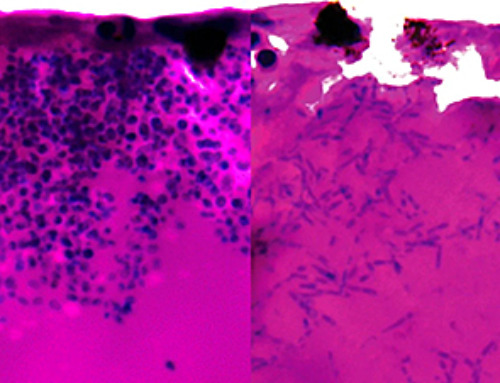Researchers from the University of Liverpool have shown the potential of repurposing an existing and cheap drug into a long-acting injectable therapy that could be used to treat Covid-19.
In a paper published in the journal Nanoscale, researchers from the University’s Centre of Excellence for Long-acting Therapeutics (CELT) demonstrate the nanoparticle formulation of niclosamide, a highly insoluble drug compound, as a scalable long-acting injectable antiviral candidate.
The team started repurposing and reformulating identified drug compounds with the potential for COVID-19 therapy candidates within weeks of the first lockdown. Niclosamide is just one of the drug compounds identified and has been shown to be highly effective against SARS-CoV-2 in a number of laboratory studies.
Using their expertise in the fields of materials chemistry, long-acting drug delivery and pharmacology, CELT scientists used nanoprecipitation to form redispersible solid drug nanoparticle formulations of niclosamide that can be stored as solids, reconstituted with water and utilised as long acting injectables. Their research has demonstrated sustained circulating drug concentrations may be maintained for the duration of early infection after a single injection.
CELT is co-directed by pharmacologist Professor Andrew Owen and materials chemist Professor Steve Rannard at the University of Liverpool.
Professor Steve Rannard said: “Repurposing drug compounds is much more than using existing medicines for a new disease. The existing active drug compound needs to be shown to be active at a significant level, then reformulated to address new challenges. The conventional route of administration may also not be relevant and modifying the way the patient receives the drug compound is highly critical to efficacy. Niclosamide is an ideal candidate to be taken forward as a potential long acting injectable therapeutic to treat Covid-19.
“This is still in early-stage development but the CELT team are currently working with a contract manufacturing organisation to take this forward towards scale up and clinical manufacture. This work is progressing well and if successful, human trials would be next. We envisage a future `Test-and-Treat’ scenario where infected people are treated at the point of diagnosis with the full course of therapy in one injection.”
Professor Andrew Owen said: “Repurposing of medicines for SARS-CoV-2 has yielded mixed results, with some clear successes for immunomodulatory drugs such as dexamethasone, and work underway to repurpose drugs like favipiravir and molnupiravir that were designed for other viruses.
“The ultimate utility of our long-acting injectable can only be determined in adequately powered and well controlled randomised clinical trials but unlike other drugs that have been explored for repurposing niclosamide target concentrations may be achievable in humans. The formulation has shown great promise in preclinical studies at a time when it is increasingly evident that drugs are urgently required to compliment the vaccines.
“A global pandemic requires a global solution, and it is critical that interventions are available to everyone and not to the privileged few. Accordingly, we are currently working to remove obstacles to availability in low- and middle-income countries to ensure equitable access if clinical success is ultimately demonstrated.”
Image Credit: Getty
Post by Amanda Scott, NA CEO. Follow her on twitter @tantriclens
Thanks to Heinz V. Hoenen. Follow him on twitter: @HeinzVHoenen
News
Scientists Unlock a New Way to Hear the Brain’s Hidden Language
Scientists can finally hear the brain’s quietest messages—unlocking the hidden code behind how neurons think, decide, and remember. Scientists have created a new protein that can capture the incoming chemical signals received by brain [...]
Does being infected or vaccinated first influence COVID-19 immunity?
A new study analyzing the immune response to COVID-19 in a Catalan cohort of health workers sheds light on an important question: does it matter whether a person was first infected or first vaccinated? [...]
We May Never Know if AI Is Conscious, Says Cambridge Philosopher
As claims about conscious AI grow louder, a Cambridge philosopher argues that we lack the evidence to know whether machines can truly be conscious, let alone morally significant. A philosopher at the University of [...]
AI Helped Scientists Stop a Virus With One Tiny Change
Using AI, researchers identified one tiny molecular interaction that viruses need to infect cells. Disrupting it stopped the virus before infection could begin. Washington State University scientists have uncovered a method to interfere with a key [...]
Deadly Hospital Fungus May Finally Have a Weakness
A deadly, drug-resistant hospital fungus may finally have a weakness—and scientists think they’ve found it. Researchers have identified a genetic process that could open the door to new treatments for a dangerous fungal infection [...]
Fever-Proof Bird Flu Variant Could Fuel the Next Pandemic
Bird flu viruses present a significant risk to humans because they can continue replicating at temperatures higher than a typical fever. Fever is one of the body’s main tools for slowing or stopping viral [...]
What could the future of nanoscience look like?
Society has a lot to thank for nanoscience. From improved health monitoring to reducing the size of electronics, scientists’ ability to delve deeper and better understand chemistry at the nanoscale has opened up numerous [...]
Scientists Melt Cancer’s Hidden “Power Hubs” and Stop Tumor Growth
Researchers discovered that in a rare kidney cancer, RNA builds droplet-like hubs that act as growth control centers inside tumor cells. By engineering a molecular switch to dissolve these hubs, they were able to halt cancer [...]
Platelet-inspired nanoparticles could improve treatment of inflammatory diseases
Scientists have developed platelet-inspired nanoparticles that deliver anti-inflammatory drugs directly to brain-computer interface implants, doubling their effectiveness. Scientists have found a way to improve the performance of brain-computer interface (BCI) electrodes by delivering anti-inflammatory drugs directly [...]
After 150 years, a new chapter in cancer therapy is finally beginning
For decades, researchers have been looking for ways to destroy cancer cells in a targeted manner without further weakening the body. But for many patients whose immune system is severely impaired by chemotherapy or radiation, [...]
Older chemical libraries show promise for fighting resistant strains of COVID-19 virus
SARS‑CoV‑2, the virus that causes COVID-19, continues to mutate, with some newer strains becoming less responsive to current antiviral treatments like Paxlovid. Now, University of California San Diego scientists and an international team of [...]
Lower doses of immunotherapy for skin cancer give better results, study suggests
According to a new study, lower doses of approved immunotherapy for malignant melanoma can give better results against tumors, while reducing side effects. This is reported by researchers at Karolinska Institutet in the Journal of the National [...]
Researchers highlight five pathways through which microplastics can harm the brain
Microplastics could be fueling neurodegenerative diseases like Alzheimer's and Parkinson's, with a new study highlighting five ways microplastics can trigger inflammation and damage in the brain. More than 57 million people live with dementia, [...]
Tiny Metal Nanodots Obliterate Cancer Cells While Largely Sparing Healthy Tissue
Scientists have developed tiny metal-oxide particles that push cancer cells past their stress limits while sparing healthy tissue. An international team led by RMIT University has developed tiny particles called nanodots, crafted from a metallic compound, [...]
Gold Nanoclusters Could Supercharge Quantum Computers
Researchers found that gold “super atoms” can behave like the atoms in top-tier quantum systems—only far easier to scale. These tiny clusters can be customized at the molecular level, offering a powerful, tunable foundation [...]
A single shot of HPV vaccine may be enough to fight cervical cancer, study finds
WASHINGTON -- A single HPV vaccination appears just as effective as two doses at preventing the viral infection that causes cervical cancer, researchers reported Wednesday. HPV, or human papillomavirus, is very common and spread [...]





















